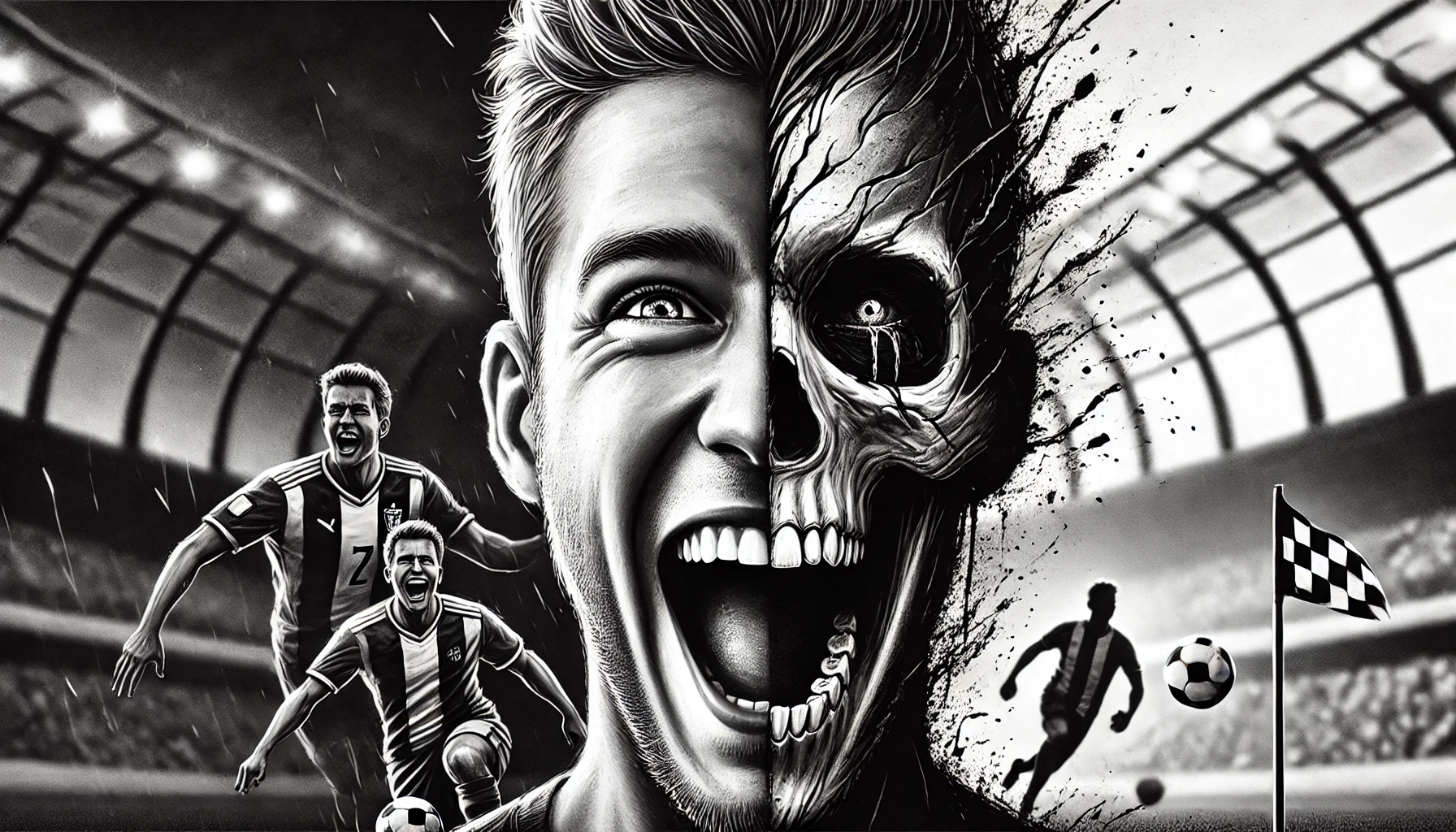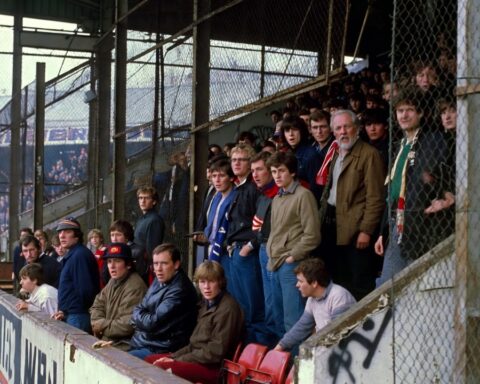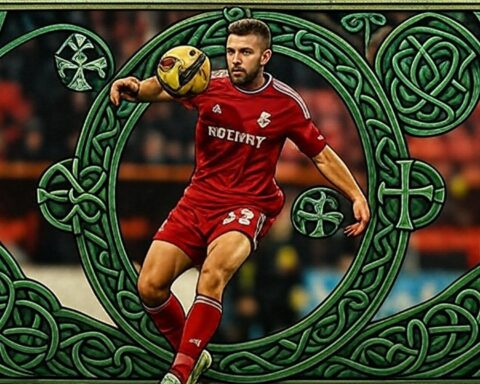(This article was originally written by Paul Cahill in January 2015)
“Know thyself” ancient Greek aphorism
How well do you know yourself? For example, are you part of an in-group or out-group? Have you ever succumbed to de-individuation or disinhibition? Are you a BIRG-er? Do you have a tendency to CORF? Prone to cognitive bias perhaps? Are you just about to click to the next page because of all the pretentious questioning?
Well don’t, hang on in there and we’ll take a peek deep inside the tiny inconsequential mind of the average commoner-garden football fan, you and me included, and wonder why we are the way we are.
Believe it or not most people are prone to all of the above in some shape or form, and football fans more-so than most. The psychological jargon is just another means of communicating what we already know about the modern sports consumer.
We are indeed a changeable, fickle, loyal and scornful lot, known to flip-flop from casual interest to passionate rage, and joyous celebration to obnoxious louting, all in your average sporting weekend afternoon.
Whether you are swearing at the telly, or spilling beer down the pub, singing your team to victory in the stands, or feeling miserable on a Monday morning after your team loses to those bastards, we all suffer the enjoyment of the football fandom. Why?
If you are a BIRG-er, a term coined by Professor Robert Cialdini of Arizona State University, then the answer is almost self-explanatory, i.e. you like to Bask In Reflected Glory. The release of the chemical dopamine into the brain gives us pleasure, makes us happy.
This dopamine buzz can be achieved in many different ways; through food, physical activity (Yes.), recreational or prescription drugs, dancing to the choons after imbibing the said recreational or prescription drugs, or vicariously enjoying the victories, great and small, of your beloved football team.
We all know a BIRG-er or two don’t we? They sing when they’re winning, don’t give a shit when they’re losing type, the we-win but they-lost kind of follower; the majority of Ireland fans actually! These people are also the ones most likely to CORF, or Cut Off Reflected Failure (Snyder et. al.).
After a humbling performance or defeat these fans will distance themselves from the team, cutting themselves off from the perceived failure, and move on to the next opportunity for reflected glory.
There’s nothing wrong with being a BIRG-er though, all fans partake in a little BIRG-ing from time-to-time. That’s the whole point isn’t it? Or maybe it’s not about individual pleasure at all.
Maybe it’s about the joy one can take from being part of something bigger. After all, to identify with other people who are similar to you in some way, while also defining yourself by what you are not, is a fundamental concept of social psychology.
An in-group is a social group to which a person psychologically identifies as being a member. By contrast, an out-group is a social group with which an individual does not identify.
The vast majority of people, whether they know it or not, define themselves by the in-groups they include themselves in, and the out-groups they point and laugh at from levels of varying degrees.
The dynamic between in-groups and out-groups can vary wildly of course; We’re men, they’re women; We’re white, they’re black; We’re Christian, they’re Muslim; We’re United, they’re Liverpool, and so it goes. Even in football the in-group/out-group dynamic, while pretty benign in most places, can boil over into violent physical episodes in others.
Hooliganism in British football in the 1970s and 80s is an example of the detrimental impact that defining yourself in this way can have on the individual and society; although racism, sectarianism, homophobia, anti-Semitism and the holocaust are probably more apt examples.
Dividing society along these lines can be dangerous, but there’s obviously an up-side or else we wouldn’t do it. This up-side involves all the usual shtick; the bonding, fraternity and community within the group, however, you can get that at mass every Sunday too.
Maybe the level of de-individuation that takes place has something to do with it, with a little bit if displacement thrown in for extra mental-health.
De-individuation, or losing one’s sense of individual identity, can be achieved in many group related activities where emotions run high, such as music gigs, political protests, or a storming chant in mass.
This leads to disinhibition, or a lack of restraint that is manifested in an unusual disregard for social convention, which is far more prevalent in football than those other social events, and can be fun and euphoric.
The chanting, jeering and gesturing at the games; the angry curses aimed at the referee on the telly or the opposition out-groups are just a couple of minor examples of how we displace aggression and lose inhibitions.
However, there are also people who can lose themselves in the crowd, people who wouldn’t normally hold views that are racist, sectarian, sexist or just idiotic, can become disinhibited within their in-group.
This may lead to discourse or behaviour that they wouldn’t normally engage in such as offensive or obscene chants; use of foul and abusive language; hooliganism; gang fighting; and rioting; if you’re not careful! In a crowd, euphoria and tragedy are equally contagious.
So what type of group is the best for you? The thing about being a BIRG-er and a CORF-er is that you’re getting a bit short-changed. Granted, there are benefits too. BIRG-ers enjoy the camaraderie, the social inclusion elements, and the aesthetics of the game, while experiencing only mild and momentary disappointment in defeat.
However the buzz they get from winning is small compared to the more invested fan. This is because the amount of dopamine that is released in the brain is dependent on how expected the victory is. Supporters of the bigger clubs who almost expect victory every week, release only a small amount the chemical when the expected victory occurs.
Think of the gift that you picked out yourself but she buys for you, it’s nice and all but there’s no surprise element. It’s those unexpected victories; those surprise results that really get the blood pumping and the brain chemicals flowing.
The wonder-goal out of the blue; the rousing come-back after you’re two-nil down; knocking the top team off their –effing perch; the ten-team accumulator that you never thought had a chance; these unexpected victories send dopamine rushing into your brain that would light up an MRI-scan like a fireworks display.
This explains why United fans almost became bored of winning the league in the early 2000s, and why many fans of the top teams tend to shrug off most victories that they expected to win anyway.
Fans of these teams must set higher and higher expectations to achieve that win buzz. It’s not good enough to simply win a football match anymore, you must win The Cup, The League, in Europe; you must qualify in fourth, in sixth; you have to beat those bastards.
This is a lot like living in the rat-race, always striving in that Sisyphus-ian way to attain and accumulate and acquire that which will never be enough. Football can be more reflective of the average, easy-going, sometimes up-sometimes down, mostly coasting kind of life if you follow a mid-table, occasionally over-achieving, more often under-achieving type of club.
A push for the Champions League this season, a scrap with relegation the next, and mid-table obscurity for the most part; these are the types of clubs from which we can take most psychological nourishment.
It’s probably too late for you. You, like me, most likely support one of those bigger teams where you want and expect to win every game. However, it’s not too late for your children.
If you want to raise a shallow and superficial Veruca Salt-type football fan, get the big-club baby-grow and start conditioning early; but if you’d prefer to raise a well-balanced, pragmatic Charlie Bucket, who has experienced enough failure and disappointment to be able to really enjoy the fruits of happiness when they do fall from the tree of life, then give them a Newcastle, or Aston Villa jersey for their fifth birthday. When they ask you why, just tell them it’s all psychological.













Follow Me